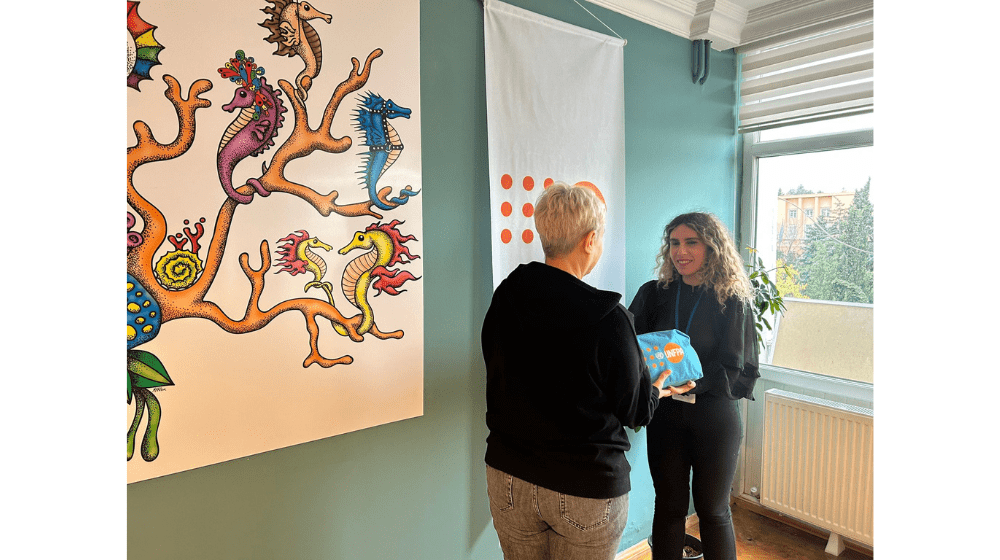All over the world, millions of people are living with HIV or AIDS. Stigmatization and discrimination put already vulnerable groups, especially refugees and migrants, at even higher risk of being infected with HIV and they experience inequalities even more, particularly access to basic information and services required for the prevention and treatment of HIV/AIDS. However, the inequalities which perpetuate the HIV pandemic are not inevitable. It is in our hands to change this situation. United Nations Population Fund, UNFPA Türkiye supports the sexual and reproductive health and protection of key refugee groups with the financial support of the U.S. Department of State’s Bureau of Population, Refugees, and Migration (PRM) and EU Humanitarian Aid.
ANKARA, TÜRKİYE - Mila has been living with HIV since 2018. Her story, which began in Ukraine, continues in Türkiye, where she has fled due to the war. She not only feels safer but also both physically and mentally healthier in Türkiye thanks to the assistance she receives from the United Nations Population Fund, UNFPA Türkiye, made possible by the financial support of the U.S. Department of State’s Bureau of Population, Refugees, and Migration (PRM) and EU Humanitarian Aid.
53-year-old Mila came to Türkiye for the first time in 2014 as a tourist without knowing that 8 years later, she would flee war in her country and return to Türkiye to take refuge. After the war in Ukraine began, Mila came to Ankara in March, 2022 along with her daughter. She has escaped the war, but her struggle against HIV became even more difficult in a foreign country.
Mila states that after being diagnosed as HIV positive in 2018 in Kyiv, she was unable to share it with anyone for a year and completely isolated herself due to fear of being stigmatized and ostracized. Regarding the difficulties she encountered after her diagnosis, she says: “I left my job so that no one would learn about my status. I canceled out my social life and stopped seeing people. Afterwards, the mental issues I was experiencing increased even more and turned into depression.”
Mila started receiving therapy with the support of her children, but it was not easy for her to overcome her fears. She says:,“I am afraid that people would learn about my HIV positive status and would judge me. Therefore, I have lived in isolation for years. This way I was able to protect myself from discrimination but it is very difficult to live like this”.
Life has become even more difficult for Mila since the war. In Ukraine, Mila had access to her medicine, but when she fled to Ankara with her daughter she could not bring her medicine with her to continue her treatment. In Türkiye, she had no idea which medicine she needed to take, how to acquire them, and where she could apply for help. Mila says: “I did not take medicine for a while. I did not know anyone, did not speak the language, and I was even unable to go out without the company of my daughter. I went through very difficult times”.
Just as she was about to lose all hope, she learned about UNFPA Türkiye’s Refugee Support Line (0850 888 0 539) through a doctor. “I called the line and talked about my situation. They said that they could help me out and invited me to the service unit in Ankara.”
Mila went to the Ankara service unit of the Key Refugee Groups Project, where she received individual counseling from a social service expert, and information about access to services and counseling regarding her treatment from a health counselor. She was able to get a prescription for the necessary medicine through the service unit’s hospital referral service. Additionally, the Ankara service unit has provided Mila with three months of free medicine support.
Mila is grateful for the positive changes the service unit had on her life, saying “The medicine I was able to get thanks to you has been very good for me. I started feeling energetic for the first time in a long while. I increased my physical activities as well as per the doctor’s recommendation. Finally, I have started leaving my house. I love coming to the service unit. I feel safe and good here.” She says that she now goes out and socializes more frequently.
Mila has also started receiving psychosocial support from the service unit. “I know that I could call here whenever I have a problem and that you would provide support and that feels very good. You helped me access treatment and provided psychological support. Thanks to you, I was able to make plans for my social life once again,” she said. “I now feel much better and more hopeful.”
Mila has a message for those who are living with HIV like herself: “Do not isolate yourself like me. We should not stay away from our social lives. We just need to find a safe space and receive support. Both for our treatment and well-being.” Mila also has a call to the policy makers. “More opportunities can be provided for the employment of people living with HIV. I would have loved there to be appropriate employment opportunities at workplaces away from stigmatization and discrimination.”
UNFPA carries out the Key Refugee Groups Project since 2018 in collaboration with Positive Living Association and Red Umbrella Sexual Health and Human Rights Association with the financial support from European Union Humanitarian Aid. Through EU funds, protection services such as psychosocial support, legal counseling, and case management are provided for key refugee groups through 7 service units operated within the project. Additionally, since December 2021, sexual and reproductive health counseling and HIV medicine support are provided with the financial support from PRM as part of the project.


